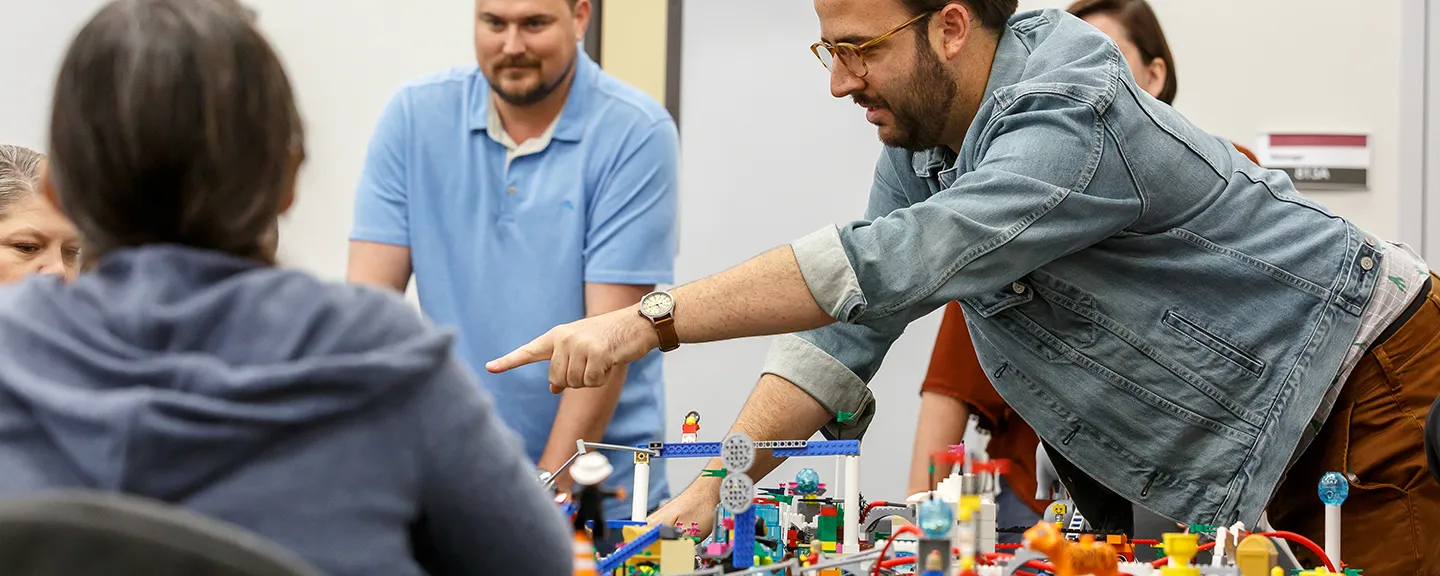- Home
- >
- APU Articles
- >
- News Article
The Many Experiential Learning Benefits of LEGO® SERIOUS PLAY®
August 22, 2019 | Written By Ashley Eneriz

Your professor predicts that you and your classmates will fall in love with the experiential learning benefits of “the power of play” and connect with your graduate degree in a deeper way. You may think you’re on a hidden camera show—but over the course of the semester, their forecast is proven correct.
There are dozens of educational benefits of LEGO® SERIOUS PLAY® (LSP). This is a big reason why Azusa Pacific University’s graduate degree programs in leadership and organizational psychology have adopted the cutting-edge approach.
Bricks Can Break Down Barriers
Jillian Gilbert, DSL, is the program director of the Master of Arts in Leadership and an associate professor in APU’s Department of Leadership and Organizational Psychology. She believes leadership is not a one-size-fits-all model, and it is essential for individuals to enter the workforce knowing that everyone matters. To help drive this point home with her students, she’s begun to leverage LSP in her own classroom.
“LSP promotes and advocates for 100 percent participation through its method of building individually and allotting time for every single person to build their individual models and share their individual ideas,” Gilbert noted. “Additionally, it advocates for shared understanding in which each individual must be represented in whatever shared model is created.”

LEGO® can connect everyone regardless of their position, race, or cultural background. Even if everyone is given the same mixed bag of LEGO® bricks, each person will create something unique. Gilbert explained that students are able to use LEGO® elements as visual metaphors about themselves or their viewpoints. They make connections between what their creations mean, why they created them, and why they selected certain pieces over others.
LSP Offers Experiential Learning Benefits
With LSP, there are no wrong answers. Ask a group of students to assemble their bricks to represent who they are, and you will get an intimate and honest look into each individual. Their approach to LEGO® play can provide valuable insight into how they think—and how they processed a pile of bricks to create a meaningful story.
Gilbert explained that, in addition to heightened classroom engagement, there are many benefits of exploring LSP as a graduate student. These benefits include:
- Learning how to articulate ideas through storytelling
- Using metaphors to prompt deeper reflection
- Fostering creative confidence
- Learning to speak up
- Knowing to concede when an issue is not worth fighting over
Join in on a workshop with LSP master trainer Robert Rasmussen in this 360˚ video.
Becoming a Better Asset for the Workplace
Organizations need agile workers who can solve problems and pivot ideas quickly. Gilbert noted that all of the experiential opportunities offered at APU provide students with a chance to learn how to form ideas, test and play with those concepts, and continue moving forward. Because playing with LEGO® bricks feels like a low-stakes activity, students don’t worry about making a wrong move—in fact, they’re more willing to try out different solutions.
“Students can play scenarios and see how they affect the system in real time,” Gilbert said. “They learn how to ask layered questions that get to the root reason for why decisions are made in the organization.”
Even if a student doesn’t consider themselves to be a creative person, building with LEGO® bricks forces their subconscious to think creatively. Gilbert added that LSP allows individuals to think (and work) in 3D, rather than just seeing a problem on paper or in their heads.
These skills can be tremendous assets to have in any leadership position or as one who drives organization development in the workplace. LSP helps students create an intimate connection with their future career choices that cannot be created through textbooks alone.